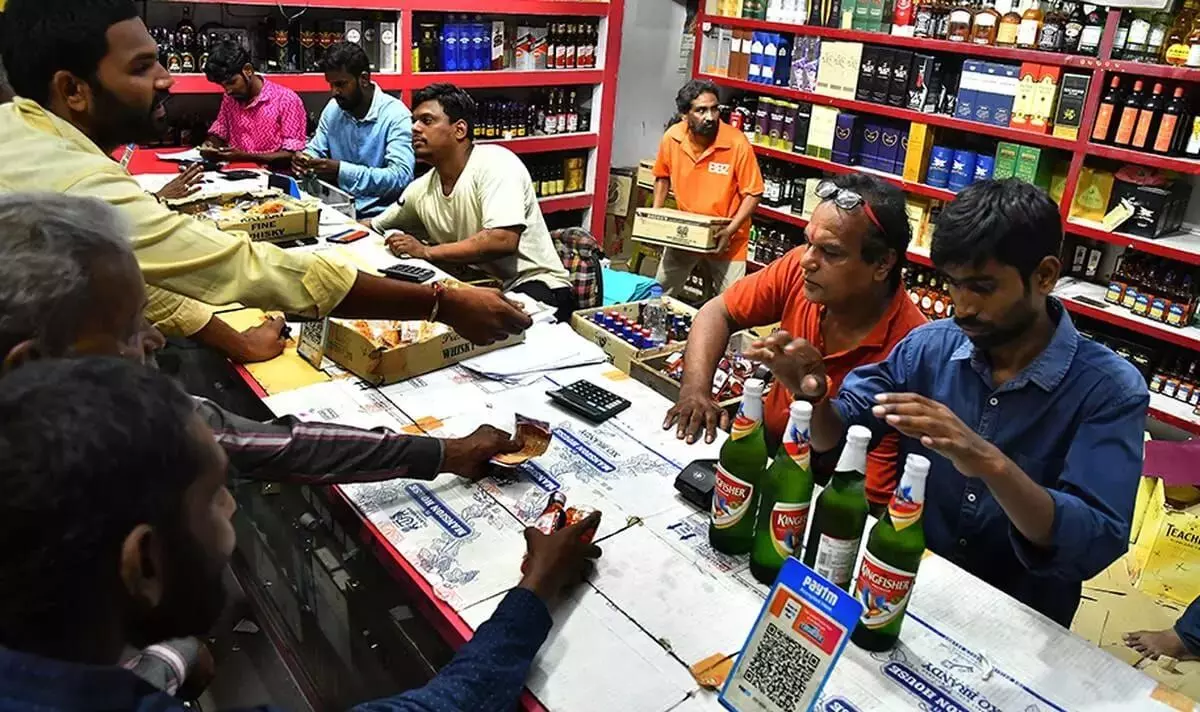Activists in Telangana urge ECI to close liquor shops until end of elections
EC is planning to come down heavily on any such means to allure voters for the upcoming general elections across the country
By Sulogna Mehta
Representational Image
Hyderabad: The distribution of liquor, cash and freebies by political parties has always been integral to the dark side to Indian elections. Despite the Election Commission’s (EC) efforts to curb such corrupt practices, liquor sales often witness a spike prior to the elections even as distribution of liquor to voters continues unfazed.
Notwithstanding the corrupt practices, a vigilant EC is planning to come down heavily on any such means to allure voters for the upcoming general elections across the country. Various humanitarian groups and NGOs have joined in on the fight by asking the EC to temporarily close down all liquor shops till the election process is over.
Women call for liquor ban
The call to shut down the distribution of liquor is not new. Many women’s groups across the country, mostly from rural areas, have always demanded the closure of liquor shops before every Assembly or Lok Sabha elections.
Padmaja Shaw, a retired professor of Journalism from Osmania University, who is also associated with various women’s rights groups, said, “We want to appeal to the Election Commission of India to close down all liquor shops in the state till the elections get over. It will prevent the destruction of families due to alcohol addiction and check other liquor-related crimes. The liquor sales during the Munugode byelections recorded an increase by several degrees. Similarly, we are expecting the sales to escalate despite EC checks during the State Assembly elections.”
‘Teenagers recruited for canvassing for netas, serving liquor’
Narrating an instance witnessed during a bypoll a few years ago in Telangana, Padmaja said, “Political parties do not even spare minors for gaining votes. Usually, in rural and peripheral areas, adults along with adolescents and teenagers, are roped in for the price of a few hundred rupees to help political campaigning. They are asked to hold party flags, and banners or take to the streets shouting slogans for the parties. The families allow the children to participate as it is a source of additional income for them. After the campaign, they are given food and even liquor to drink.”
“We have witnessed the agony of families who found that their 14-year-old son was drunk after being offered liquor bottles by political party cadres. A family riddled with a socio-economic crisis due to the father’s drinking problems gets completely ruined when the children also get addicted. This dangerous trend can be stopped only if the ECI warns parties against employing minors from being recruited for political canvassing and by completely cutting off the supply of liquor during the entire period of the elections,” said Padmaja.
Alarming facts and figures related to liquor-freebies & voting behaviour
According to the X handle of an apolitical NGO, Association for Democratic Reforms (ADR) India, which works for electoral and political reforms, during the last general elections to the Lok Sabha, as of April 10, 2019, unaccounted cash, liquor, drugs/narcotics, precious metals, freebies worth Rs 2,386 crores were seized by various enforcement agencies across the country after the Model Code of Conduct (MCC) came into effect a month before March 2019.
As per the ECI data, of these seized substances, drugs/narcotics accounted for the highest value (Rs 1,089.93 crores), followed by cash (Rs 575.60 crore) and precious metals (Rs 486.25 crore), while the liquor seized was valued at Rs 192.06 crores.
Commenting on the factors that influence voting behaviour, the organisation tweeted, “It was distressing to see that for 41.34 per cent voters, distribution of cash, liquor, gifts etc. are important factors while choosing a particular candidate to vote for.”
Apart from cash, liquor, freebies etc., the candidate’s caste and/or religion influenced 48.04 per cent of voters. The personality of the candidate was also an influence for 68.03 per cent of voters/respondents, and around 71.32 per cent of them were influenced by the candidate’s party.
Liquor sale and use: prohibition and penalty under law
As per Section 135C of Representation of the People Act, 1951, “No spirituous, fermented or intoxicating liquors or other substances of a like nature shall be sold, given or distributed at a hotel, eating house, tavern, shop or any other place, public or private, within a polling area during the period of forty-eight hours ending with the hour fixed for the conclusion of the poll for any election in that polling area.”
“Any person, who contravenes the provisions, shall be punishable with imprisonment for a term, which may extend to six months or with a fine, which may extend to two thousand rupees, or with both and such substances found in his possession shall be confiscated,” stated the Act.
Goods seized so far in Telangana under MCC
It’s been just five days since the Model Code of Conduct came into effect in Telangana. According to the Telangana chief electoral officer, cash, gold and liquor worth more than Rs 37 crores have been seized during the past four days to be compliant with the MCC.
Seizures included Rs 20.43 crores in cash, Rs 14.65 crores worth of gold, silver and diamonds, liquor worth Rs 86.92 lakhs and Rs 89 lakhs worth of ganja. So far, within the first four days, 1,196 cases were also filed under the preventative provisions of the CrPC.